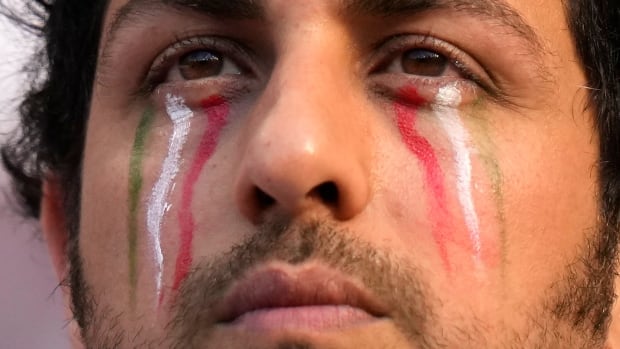The UN High Commissioner for Human Rights said on Tuesday that the situation in Iran was “critical,” describing a hardening of the authorities’ response to protests that have resulted in more than 300 deaths in the past two months.
“The rising number of deaths from protests in Iran, including those of two children at the weekend, and the hardening of the response by security forces, underline the critical situation in the country,” said Jeremy Laurence, a spokesperson for UN human rights chief Volker Turk, at a Geneva news briefing.
The Islamic Republic has been gripped by nationwide protests since the death of 22-year-old Kurdish woman Mahsa Amini in morality police custody on Sept. 16 after she was arrested for wearing clothes deemed “inappropriate.”
Tehran has blamed foreign enemies and their agents for orchestrating the protests, which have turned into a popular revolt by Iranians from all layers of society, posing one of the boldest challenges to the clerical rulers since the 1979 revolution.
Iran’s World Cup team declined to sing their anthem before their opening World Cup match on Monday in a sign of support for the protests.
WATCH | Iran’s opening World Cup match marked with protests, disputes:
Supporters at Iran’s opening World Cup match on Monday reported disputes among pro and anti government groups within the stadium, while one fan said he was asked to put away his pre-Islamic revolution flag and a T-shirt expressing support for protesters in Iran.
Deaths in 25 of 31 provinces
Later this week, the UN Human Rights Council in Geneva will hold a debate on the protests expected to be attended by diplomats as well as witnesses and victims.
A proposal to be discussed at the session seeks to establish a fact-finding mission on the crackdown in Iran. Any evidence of abuses such a body might find could later be used before national and international courts, a UN document showed.

The Office of the High Commissioner for Human Rights (OHCHR) said that more than 300 people had been killed so far, including more than 40 children. These deaths occurred across the country, with deaths reported in 25 of 31 provinces.
In the same briefing, Laurence also voiced concern about the situation in mainly Kurdish cities where it has reports of more than 40 people killed by security forces over the past week.
Iranian state media said last month that more than 46 security forces, including police, had been killed in the protests.
Government officials have not provided an estimate of any wider death count.
40 foreign nationals arrested, Iran says
Iran, which has blamed “foreign adversaries” for the protests, said on Tuesday 40 foreign nationals had been arrested for their role in the unrest.
“So far, 40 foreign nationals have been arrested for their involvement in the protests,” Iran’s judiciary spokesperson Masoud Setayeshi told a televised news conference, without revealing their nationalities.
In September, Tehran said nine Europeans had been arrested for their involvement in the protests.
Iran hits Iraqi Kurdistan
In attacks linked to the protests, Iran’s Revolutionary Guard targeted on Tuesday a base of what it says are “separatist terrorists” in Iraq’s Kurdistan region with missiles and kamikaze drones, the semi-official Tasnim news agency said.
Tehran accuses Iranian Kurdish groups taking refuge in Iraq’s Kurdistan of fomenting the nationwide protests.
“In today’s operation, the base of a separatist terrorist group near Kirkuk, known as the Free Kurdistan Party, was targeted by missiles and kamikaze drones,” Tasnim said.
The news agency also said that since Nov. 14 the Revolutionary Guards launched a new round of attacks against “separatist terrorists” in response to the group’s alleged anti-security actions in Iranian cities bordering Iraq.
Last week, two people were killed and 10 were wounded when rockets and drones hit the headquarters of Iranian Kurdish parties in the autonomous Kurdish region of Iraq.
Nuclear move may irk Western powers
Meanwhile, Iran has begun enriching uranium to 60 per cent purity at its underground Fordow nuclear site, the country’s nuclear chief said on Tuesday, a move that may irk Western powers pushing Tehran to roll back its nuclear work by reviving a 2015 pact.
Enrichment to 60 per cent purity is one short, technical step away from weapons-grade levels of 90 per cent. Nonproliferation experts have warned in recent months that Iran now has enough 60-per-cent-enriched uranium to reprocess into fuel for at least one nuclear bomb.
“We had said that Iran will seriously react to any resolution and political pressure…. That is why Iran has started enriching uranium to 60 per cent purity from Monday at the Fordow site,” said Mohammad Eslami, according to Iranian media.
The International Atomic Energy Agency’s (IAEA) 35-nation Board of Governors on Thursday passed a resolution ordering Iran to co-operate urgently with the agency’s investigation into uranium traces found at three undeclared sites. Iran had warned that the move could impact its “constructive relations” with the agency.
Earlier this month, the IAEA said it believes that Iran has further increased its stockpile of highly enriched uranium. As recently as last week, the agency criticized Tehran for continuing to bar the agency’s officials from accessing or monitoring Iranian nuclear sites.
It has been nearly two years since IAEA officials have had full access to monitor Iran’s nuclear sites, and five months since the surveillance equipment was removed.

U.S. Secretary of State Antony Blinken said on Tuesday he could not confirm Iran’s announcement.
Speaking on a visit to Qatar for the U.S.-Qatar strategic dialogue, Blinken said Iran has tried to “insert extraneous issues” into efforts to revive the deal between Iran and world powers that eased sanctions on Iran in return for curbs on its nuclear program.
The United States unilaterally pulled out of the nuclear deal in 2018, under then-president Donald Trump. It reimposed sanctions on Iran, prompting Tehran to start backing away from the deal’s terms.


